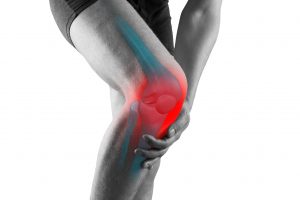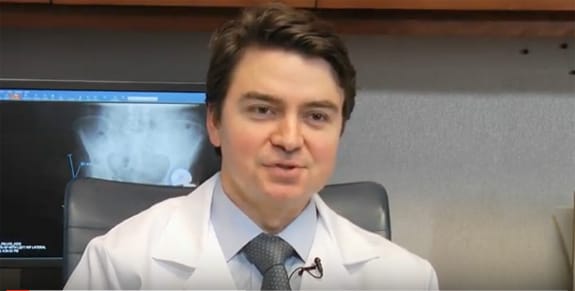Knee Osteoarthritis Treatment in NYC

What is knee osteoarthritis?
Osteoarthritis (OA), also known as age-related arthritis or degenerative joint disease, is a deteriorating disease that affects the joints in your body. It can occur in any of your body’s joints, including the knees, hips, shoulders, and wrists. Knee osteoarthritis occurs when the cartilage that surrounds the bones in the knee joint is worn down. As a result, the bones in the joint begin rubbing together, causing inflammation and pain. Commonly seen in older patients, this disease tends to develop as you age and worsens over time. Knee osteoarthritis can cause knee pain that may range from dull, achy, sharp, or even debilitating, depending on the location and severity of the condition.
Who is at a greater risk for Knee Osteoarthritis?
Osteoarthritis is caused by the gradual wearing down of cartilage in the knee joint. There are a number of different factors that may contribute to the development of this condition, including:
- Normal aging
- Knee injuries
- Improperly formed or underdeveloped joints
- Hereditary cartilage defects
- Extreme stress on joints over time
- Carrying extra weight
What are the symptoms of knee osteoarthritis?
Any of the following symptoms of knee osteoarthritis may warrant a consultation with Dr. Peter K. Sculco, board-certified orthopedic surgeon and knee specialist:
- Knee pain that worsens with activity
- Swelling
- Warmth around the joint area
- “Cracking” or “crunching” sound when moving the knee joint
- Decreased range of motion
- Stiffness
What Our Patients Have to Say
“I could not walk a 1/2 block without excruciating pain in my right knee. Dr. Sculco explained to me that I had bone on bone and arthritis and that a knee replacement would be beneficial. I agreed, had surgery in January, and am back riding my horses and walking again, pain-free! Dr. Sculco is The Best!”
Click here to Read More Reviews!
How is osteoarthritis of the knee diagnosed?
Methods that are commonly used to diagnose knee osteoarthritis include:

Physical Examination for Knee Osteoarthritis Diagnosis
Diagnosis begins with your doctor conducting a thorough physical exam, which includes examining the range of motion and function of the knee. In addition, your doctor will analyze your personal and family medical history to help make an accurate diagnosis.
X-Rays for Knee Osteoarthritis Diagnosis
X-rays are often taken in order to identify certain abnormal characteristics of the joints, such as narrowing of the cartilage.
Other Testing for Knee Osteoarthritis Diagnosis
In cases where an x-ray is not detailed enough or your doctor finds it is necessary for further testing, an MRI or CT imaging scan may be used to evaluate the knee more closely. In addition, blood tests may be used to rule out other health problems like rheumatoid arthritis and other conditions that cause joint pain.
What is involved in osteoarthritis knee treatment?
There are a number of treatment options for knee osteoarthritis, depending on your needs and the severity of the condition. Conservative treatments for knee arthritis commonly include:
- Rest
- Abstaining from activities that cause significant stress on the knees
- Physical therapy
- Exercise (low impact)
- Knee injections
- Medication prescribed by a doctor
- Weight loss
What are Surgical Treatment Options for Knee Osteoarthritis?
If conservative treatments fail to improve the function and discomfort in your knee, you may be a candidate for surgical treatment. Dr. Peter K. Sculco is dedicated to providing patients with advanced treatment options using the highest quality implants and the latest surgical techniques.
Dr. Sculco specializes in the following knee osteoarthritis surgery treatment options:
Schedule a Consultation
If you’re suffering from knee pain caused by knee osteoarthritis, the first step to restoring your mobility and quality of life is scheduling an evaluation with an experienced orthopedic knee specialist. Dr. Peter K. Sculco provides personalized care paired with world-class orthopedic training. Call 212.606.1771 to request an appointment.






